The Chernobyl Project 1991/1992
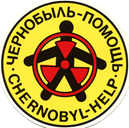
Download pdf version
Download the Chernobyl Gilwell Video
In April 1986, a nuclear reactor at the Chernobyl power station in Ukraine exploded sending radioactive materials into the environment across many parts of Europe. A vast number of people were affected by the fallout, especially children, who developed radiation sickness, malnutrition, and the inability to experience a balanced diet. Many of their staple foods (milk, fruit, vegetables) were irradiated adding to their overall health conditions.
In 1990, UNESCO, together with the Soviet Children’s Fund and the World Scout Bureau established a program to bring children to various countries to remove them from their local environment and improve their physical and mental health. The initial project brought 46 children (boys and girls who were mostly orphaned or abandoned) between 11 and 14 years from Ukraine and Belarus to Melbourne in April 1991 for four weeks, sponsored by Victorian Scouts. A number of young adults accompanied the children to act as interpreters and supporters.
The children were assigned to host families in Scout Groups in Heathmont, Frankston, Balwyn, Kew, Mitcham, Templestowe, and Glen Waverley, who provided clothing, a Group scarf, pocket money and other personal items to care for the welfare of the children’s needs during their stay. Almost none of the children spoke any English and a 60-page Russian/English ‘Pictionary’ of statements was provided to host families.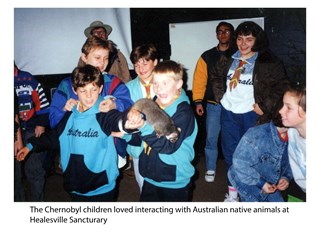
Victorian Branch gained sponsorship support from business, community organisations and individuals to provide medical checks, medicines and hosted the children at a week-long camp at Gilwell Park, Gembrook, as well as visits to Melbourne Zoo, Puffing Billy and to other activities.
The home hospitality experience created a stable opportunity for the children to be clothed, have regular rest, experience Australian food, and integrate into Australian family life. Some host families ‘twinned’ together to ensure that the Ukraine children still had regular contact. with each other.
Despite the language barrier, communication between the Ukrainian and Australian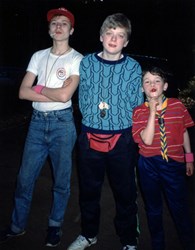 children did not tend to be a problem.
children did not tend to be a problem.
The interpreters were in great demand, although sign language was widely used.
Word swapping was common - the Australian kids all learned to say ‘silly goat’ in Russian; the Ukraine kids learnt to say ‘stupid’ in English and inevitably Russian swear words were taught to the Australians!
The main aim of the visit was to provide the children with a break in a clean environment and in turn, it indirectly helped to provide them with new skills.
Headaches, lethargy, nose-bleeds were replaced with rosy cheeks and boisterous high spirits. They learnt how to get on with other people, how to pitch in and help at home and camp and during the last weeks, it became obvious most had gained in confidence by their interaction with others.
At Gilwell Park, a wide range of activities were arranged for the children,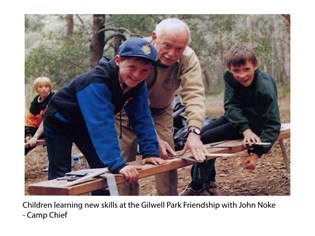 including canoeing, archery, boomerang-making, orienteering, tree planting, etc. For many it was the first time that they had camped out under canvas. The camp organisers found that the children were fascinated by more modern activities such as computer games, videos, and electronic wide games. Local wildlife also fascinated them around camp. Some of the children became skilled in ’finding the Bunyips in the bush’ and the Gilwell Gauntlet Commando became an outstanding activity. Scouts from host Groups camped in Troops and the children learned how to put up tents, prepare and cook meals and explore the areas and take part in campfires and night time activities.
including canoeing, archery, boomerang-making, orienteering, tree planting, etc. For many it was the first time that they had camped out under canvas. The camp organisers found that the children were fascinated by more modern activities such as computer games, videos, and electronic wide games. Local wildlife also fascinated them around camp. Some of the children became skilled in ’finding the Bunyips in the bush’ and the Gilwell Gauntlet Commando became an outstanding activity. Scouts from host Groups camped in Troops and the children learned how to put up tents, prepare and cook meals and explore the areas and take part in campfires and night time activities.
The case of the Disappearing Fruit
Leaders and the caterers were perplexed about how quickly the fruit bowl 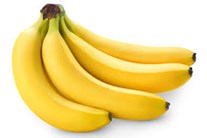 became emptied in the dining area. Restocking it led to it disappearing just as quickly as it was filled. Bananas were vanishing swiftly. The mystery was solved when a sleeping bag check of the Chernobyl children turned up the missing fruit as many had never seen fresh fruit in their homeland. They were told to eat as much as they wanted, and the bowl would be refilled regularly to cater for their appetite. The children had never seen chocolate easter eggs at home. This was a new experience, and they were somewhat regulated to avoid overeating and affecting their digestive systems.
became emptied in the dining area. Restocking it led to it disappearing just as quickly as it was filled. Bananas were vanishing swiftly. The mystery was solved when a sleeping bag check of the Chernobyl children turned up the missing fruit as many had never seen fresh fruit in their homeland. They were told to eat as much as they wanted, and the bowl would be refilled regularly to cater for their appetite. The children had never seen chocolate easter eggs at home. This was a new experience, and they were somewhat regulated to avoid overeating and affecting their digestive systems.
In 1991 the children were weighted to demonstrate improvements in their health with exercise, nutritious food and building resilience from their time in Australia.
As the experience ended with the imminent departure of the children to return home, emotions ran high amongst the organisers, Group members, host families and the children themselves. Final goodbyes at the airport were filled with tear and heart-wrenching embraces. The children were given clothing and other gifts to take back and be shared at their orphanages. The tears of many were those of joy, to be able to bring a positive difference in their lives, physical and mental improvements, and memories for the future lives of these children.
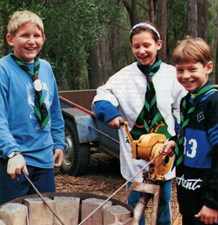
In 1992, a wider visit program occurred to other Australian Scouting states, again coordinated by Richard Simpson, the National International Commissioner. 54 children came to Victoria with 9 Soviet Interpreters who were also hosted by the Groups.
A similar program was established for host families building on the experiences from 1991. The children came from the Commonwealth of Independent States (former Soviet Union) and there was a greater emphasis on the children’s health an arrival through blood tests and to make sure they had long sleeved shirts hats and sunglasses (even in winter) to ensure they were not exposed to UV radiation. This visit occurred in June and July 1992 and a Leaders briefing day occurred to ensure all the details and questions were answered. The month-long visit included a week’s camp at Eumerella at Anglesea and three weeks of home hospitality with families of the host Groups.
At Eumerella, they camped in Troops with their host children and a wide range of activities were provided, including evening activities and campfires. The camp offered the opportunity for the children to engage in Australian culture and Russian cooking recipes, songs and handicrafts were a part of the experience.
During the host stay period they attended an AFL football match (and met the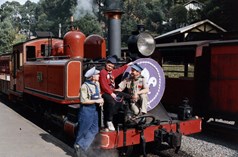 players), visited the Melbourne Zoo and Puffing Billy as well as activities organised by their local Groups. Host Groups included 3rd Highton, Heathmont, 1st Keilor Village, 7th Ballarat,1st/2nd Warragul,1st Lower Plenty, Wonga Park, Milpara,1st Beaumaris and 10th Malvern who were supported by fundraising efforts from Victorian Branch and local organisation and supports.
players), visited the Melbourne Zoo and Puffing Billy as well as activities organised by their local Groups. Host Groups included 3rd Highton, Heathmont, 1st Keilor Village, 7th Ballarat,1st/2nd Warragul,1st Lower Plenty, Wonga Park, Milpara,1st Beaumaris and 10th Malvern who were supported by fundraising efforts from Victorian Branch and local organisation and supports.
Dr. Michael Kidd – Project Medical Adviser and now Deputy Chief Medical Officer of Australia).
“The memory of the Chernobyl children will remain with us. The increased understanding and international friendship engendered by their visit has profoundly affected all participants. As a result of the worldwide operation of this program, increased public awareness has led to a marked increase in aid to assist all the victims of the world’s worst nuclear accident”.
Personal Reflections
These comments were gathered from newspaper articles and other past and present leaders who contributed to establishing and coordinated the visit of these children to Victoria.
Our host child lived in the landlocked town of Kiev and had never seen the beach before. She made the trip to Brighton beach with her host family from Balwyn who were able to give something special to a child from Chernobyl. My 11-year-old daughter, Georgia matured before her eyes as she took care of Natasha and her translation guide. Their bonding happened despite the language barrier as it is often with children.
Johanna Ryan - Balwyn
1st Glen Waverley Scouts opened their hearts and homes to the young victims of the 1986 Chernobyl reactor disaster. The project provided a wonderful experience for both the Russian children and their Scouts as part of an international care giving program. The highlight of their time was the Gilwell Park Friendship Camp at Gembrook where they participated in many activities.
Bill (Blinky) Lingard – Group Leader
The Templestowe Scout Group played host to six children and Alf Smith the Group Leader said their members were honing up on their Russian but would rely on a lot of sign language and humour to communicate with their young charges. During their stay the youngers visited the Melbourne Zoo, attended an Australian school, and took part in many Scouting activities. They enjoyed chewing gum, swigging Coke, eating meat pies and lunch at McDonalds, together with American cartoons were a hit with the youngsters.
The late Dr. Alf Smith – Templestowe
Doctors don’t usually cry, but the sight of thousands of children, orphaned and contaminated by the world’s most horrific nuclear has made more than one grown man weep. Balwyn doctor, Michael Kidd visited Chernobyl in 1990 to see the and hear the full extent of the aftermath of the explosion. “I was horrified” he said, doctors are used to the sick, but not this number of sick people in such numbers and without the basic medical research requirements”. A population the size of Victoria has been affected and the most susceptible are children and teenagers going through puberty.
Dr. Michael Kidd – Balwyn
For 10-year-old girl, Australia is so bright and full of beautiful birds. “I really love the camp’s coffee shop with all the cakes and nice hot drinks. I haven’t seen a shop like this before”. Her interpreter, thinks “Australian is one big orchard as you have so many exotic fruits. Only occasionally do we see bananas in Kiev, but you have oranges that are actually orange - ours are green or brown”.
Janna and Irene at Gilwell
For Mrs Van Den Hevvel of Heathmont, “it was a humbling experience for all of us. The hardest thing was to say goodbye to our host child after he hugged me and called me Mum.” He was put into an orphanage by his mother about a year before because she could no longer cope with him. He has a brother living with his grandmother and a sister at home with his mother and he has not seen any member of his family for a long time.
Heathmont Scout Group
In March 1991, our family agreed to be involved in the Chernobyl Project with Scouts Australia. We hosted a 14-year-old child, 192cm orphan from Kiev, Ukraine. We had expected an 8-year-old! He towered above all in our family.
He had grown up in a boy’s orphanage so was unused to living with girls and women and would stand up and snap to attention the moment David walked into a room. Initially he would only take direction from David. In the first 48 hours this led to a lot of confusion. The confusion also surrounded language; we had learned some Russian, but he only spoke Ukrainian.
We soon settled down, and he had a huge appetite and was excited to be handed a basket to fill in the local greengrocer. He would often devour 10 bananas in a day and loved watermelon, pineapple, and berries. He attended school with our sons, adored our Labrador and taught our sons Russian swear words. He loved the electric windows in our cars, our sound system and the boys Walkman’s and electric guitars. He was a lovely young man, and he stole our hearts. He had no idea how to relate to our 19-year-old daughter and would initially duck out of the room when she walked in.
Too soon it was time for him to go home. We fitted him out in jeans and T-shirts with the right logos and a matching jacket to our teenage sons…by now he was calling me “Mama” and our parting was very emotional.
Over the years we have kept touch with him, we have sent him money and clothes regularly through the Ukrainian Community here in Victoria, rejoiced in his acceptance in the Army and cried when he was medically discharged. We have celebrated his truck licence and the work it provided him and cried when he got caught carrying black market goods. He grieved with us when our son Adam died…they were close in age and nature, an exceptionally good match for both of them.
In 2010 we provided the funds for a brilliant white wedding dress with all the trimmings for his bride and we rejoice that he seems to have settled into a reasonably stable job and found happiness..Very occasionally an email written in Cyrillic will arrive and our minds fly back to the time when an awkward 192cm 14-year-old arrived in our lives.
Gaye Headberry – Balwyn
1st Glen Waverley Group hosted children from Chernobyl in 1991 and took part in the Friendship Camp at Gilwell Park. On arrival, the children were quite quiet and timid, however most revealed they had brought a bottle of vodka for their hosts, which was strong proof as well! But soon gained confidence with their host families and activities. They were given an allowance to spend, and one boy visited the chemist to buy baby bottles and teats to take back to the orphanage. The local OPSM store provided free spectacles for a number of the children. They visited Healesville Sanctuary and were enthralled with the Australian native animals. At Gilwell Park they thrived on the camp activities and ate an enormous amount of food, especially fruit. One highlight at camp was the Knotting Tree.
Jan McGowan – Glen Waverley
As the Scouts Australia International Commissioner at the time, I oversaw setting up the visits in 1991 and 1992. I called on a wide range of leaders and supporters from within and outside Scouting to raise money for the events and coordinate activities and home stays for the children. These were the days before mobile phones and email and correspondence and general organisation occurred by telephone, letter, and telex.
Dr. Michael Kidd (then a Scout Leader from Balwyn) visited Ukraine prior to the visit and was the backstay of medical knowledge and coordination to cover any potential medical issues with the children.
With the fantastic support of Groups in the greater Melbourne area, they built a network of parents and helpers to arrange visits to Healesville Sanctuary, Puffing Billy, Government House, and other local attractions and took part in the Friendship Camp at Gilwell Park in 1991. This included an ABC program hosted by the late Peter Couchman which gained viewing Australia wide to audiences of the visit.
The second visit in 1992 was supported by groups in Highton, Warragul, Ballarat, Keilor, Lower Plenty, Wonga Park, Nunawading, Malvern, and Beaumaris with a Friendship Camp held at Eumerella near Anglesea. Similar activities for the children were arranged by Groups and host families.
Victorian Branch Scouts provided a huge contribution with the arrangement of media liaison coverage in print and TV across Victoria.
The emotional farewells from the host Groups and families and the Ukraine children were heart-wrenching; but the children left with an improvement in their health and with clothing and gifts to remember their stay in Australia. Some families kept in touch with their host child and others sadly were not so fortunate. My own family who hosted a boy who maintained contact and he came back to Australia the following year to study and joined Venturers.
Richard Simpson - Heathmont
Amongst the Chernobyl kids we had a young girl who was a budding pianist. The host family sought out a piano teacher who provided her with some lessons and a lot of material to take back home with her.
Unfortunately, I never kept in touch with any of the children, more is the pity.
One of their interpreters was a guywho was billeted by some friends of mine. He presented them with a Russian urn, which still adorns their kitchen.
We were fortunate to have one of our Cub Scout Leaders; a pharmacist, who provided all pharmaceutical requirements that were needed by our visitors, at no cost to our host families.
At camp, the Bananas copped a beating. When we were buying fruit and vegetables for our visitors, the Bananas were bought by the Box, not by the kilogram!
Reg Parsons - Milpara
The (then) Camping Association of Victoria (CAV) helped by hosting a number of activities at their campsites, including Lake Nillacootie. This gave the Chernobyl kids the opportunity to see more of Victoria and gave the host families a break.
My major involvement was in working on the Gilwell Park hosted camp for the Chernobyl kids and the kids from their host families. My major involvement was in arranging to feed everybody. I can remember a program involving campfires (run by Campfire Guru - Kees Klep); picnic walks to Kirth Kiln; water activities on the Lachan and all the fun of a big activity camp at Gilwell. We fed everyone out of the Delacombe Hall (about 40) and a ravenous lot they were!
Following a cyclone which decimated the banana crop in Queensland, the price of bananas shot up to unheard of heights (about $12.50 a kilogram) Bananas were a rare treat in Ukraine and very popular with our visitors - much to the chagrin of our host families for whom bananas had become a bit of a luxury too!
Beside Lake Nillacootie, I recall us visiting Kangaroobie, a camp owned by Bill and Jenny Bowker on the west coast of Victoria, near Port Campbell. Bill and Jenny were strongly involved with helping to develop international understanding through camping, and often hosted international campers at Kangaroobie.
I remember being “bag carrier” for Richard Simpson as we sought to drum up support for our Chernobyl hosting and attended with him several Rotary Club meetings to garner support. This was the start of my interest and involvement with Rotary which continues today.
Many host families developed a close relationship with their hosted children and maintained contact with them for some years after their return to Ukraine.
Bill Oakley - Milpara
Children and carers chosen for the long and arduous trip to Australia had to be reasonably healthy, with sicker children and their carers being offered holidays in countries closer to home. In the case of 10th Malvern, our guest children and carer came from the city of Gomel (known also as Homyel), the second largest city in Belarus.
We were given a couple of months’ warning of the arrival of our children and their carer. I called a meeting of all parents and we quickly found six families willing to host the children, with my wife Joanna and I hosting the adult carer. The children scheduled for a holiday with the Australian Scouts were to arrive in the depth of mid-winter, a deliberate decision, it being necessary to prevent these people, already suffering from the effects of radiation, from being exposed to the sun’s radiation. Regardless of the weather, they all had to wear long sleeves and a sunhat, to avoid any further exposure to radiation – solar radiation, in this instance.
The local paper got wind of our efforts, and I was inundated with offers of help from members of the community. Our visitors were apparently ineligible for health cover. My GP offered to be the honorary physician to the six children and their carer, and in the following couple of months before their arrival he studied up on the effects of radiation sickness and attended special lectures on the subject. He knew that X-rays (for a broken leg, for instance) were to be avoided at all costs, as they would only hasten the victim’s death. Our dentist was only too happy to be the honorary dentist for our seven guests, and in fact they all went home with better dental health than when they arrived in Australia!
Then an extraordinary thing happened. Out of the blue I had a call from a lady in East Malvern who was a knitter! Obviously not an ordinary knitter – she could knit a child’s pullover in less than a couple of days! And not just a plain pullover. Her pullovers would have a knitted sulphur-crested cockatoo on the front – or a wombat, or a kangaroo, or a Major Mitchell cockatoo, or a koala, or an emu, or a platypus! She offered to make a different one for each of our six children but needed their sizes! Unfortunately, I did not know the names of our visitors before they arrived, much less their sizes, nor their ages. So, she guessed their sizes and made a few extra pullovers just to be on the safe side. In the end, our fabulous knitter made over a dozen pullovers, our carer Ira received one too, and the spares were handed over to another Scout Group – I think one in Hampton – who also were preparing to host six children and a carer.
After their arrival, Ira told us that their travel arrangements had been complex. By and large, the contingent of children heading for Australia did not know each other, nor did they know their carers. Under the guidance of the carers, they had to make their own way to Moscow by a series of trains, and this was not at all easy. She explained that, after hanging around the airport for a couple of days, they caught an Aeroflot plane to Singapore; the plane was old and dirty, the crew unhelpful, and the food unpalatable.
In Singapore they transferred to a Qantas plane, which was bright and clean, the crew welcomed them with much love and kindness, and the food was excellent and plentiful!
When the Victorian continent from the Chernobyl disaster arrived at Tullamarine, we collected our guests (four girls and two boys aged from about 13 to 15, and the carer) and returned to the 10th Malvern Scout premises, where our host families gave a warm welcome to our visitors – who must have been confused and weary after their long journey, but they responded with enthusiasm. Of course, our six children could not speak a word of English, but that hardly mattered, as she had a reasonable command of our language and was in daily communication with her young charges. After a delicious meal at 10th Malvern, they then went home to their individual host families. During the next couple of weeks, we had some joint activities with all six host families, including outings to special places like the Dandenong Ranges and Phillip Island. All seven-folk visited Dr. Hein Ritman for thorough medical check-ups, and all made visits for thorough dental check-ups – but no X-rays!
Their visit to Australia was due to last for four weeks, but arrangements for the Aeroflot flight home from Singapore to Moscow were delayed for a further week. Every extra day away from their toxic homes (and toxic food) was a blessing, and the extra week also helped our seven guests to really start to learn to speak English! But alas, all too soon we had to say farewell to our guests, and we all were in tears when they departed Tullamarine airport for the very long haul back to Ukraine. Most host families maintained written contact for some years after the visit, but it is unlikely that any of our guests are still alive, due to the ravages of radiation sicknesses.
As an aside, Belarus declared independence from Russia in 1991.
I shall always be incredibly grateful for the great help offered and supplied by the local community, and especially our host families, our GP and dentist, and that fabulous knitter of pullovers with Australian motifs!
Greg Eccleston - (former Group Leader, 10th Malvern)
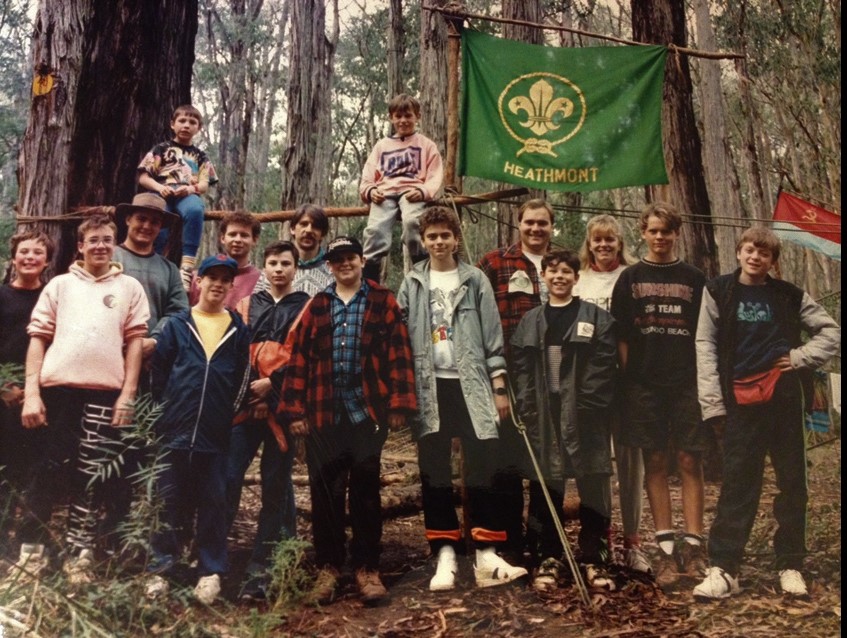
The Chernobyl children at Gilwell Park - 1991
References:
Various newspaper articles
Victorian Branch files
The Victorian Scout
Photos: contributed by Leaders and Group members
This article is in a series of Victorian Scouting History published by Scout Heritage Victoria
